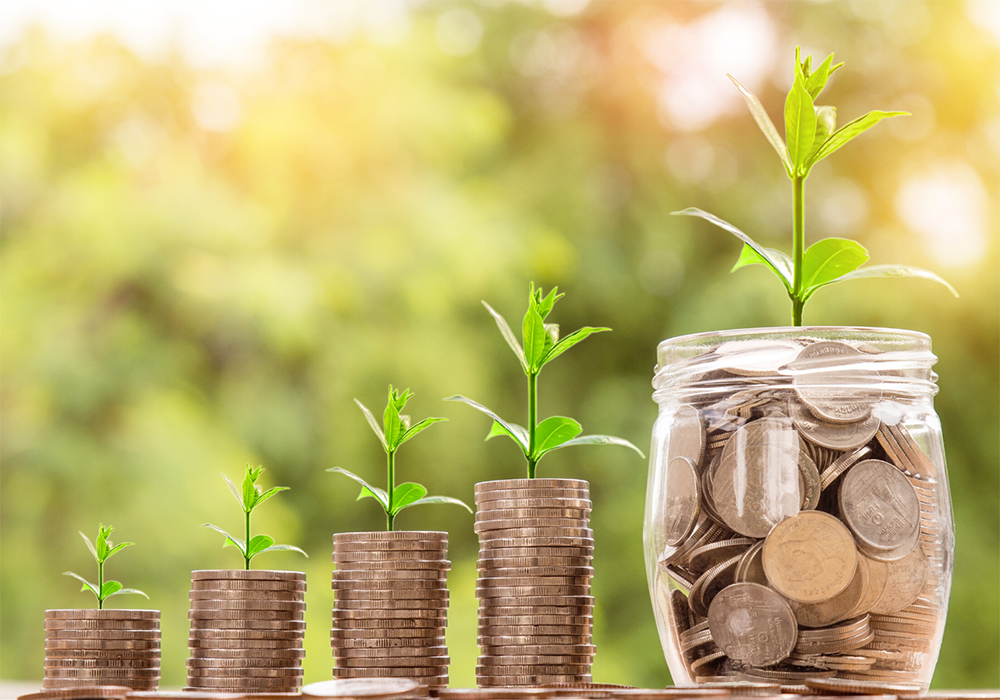Seed Capital: The Early Funding Stage For Startups

Are you an entrepreneur looking to launch your own startup? Then it’s likely that seed capital is on your mind. Seed capital is the initial funding stage for startups, and it can be a make-or-break moment for fledgling companies.
In this article, we’ll explore what seed capital is, how it works, and why it’s so important.
At its core, seed capital is simply the first infusion of cash into a new business idea or venture. This money usually comes from angel investors or venture capitalists who believe in the potential of the company and want to help get it off the ground.
The goal of seed capital is not just to fund early operations but also to provide enough runway for the founders to build out their team, refine their product or service offering, and test the market viability of their concept. With proper guidance and support during this critical phase, a startup has a better chance of securing additional rounds of funding down the line – making seed capital investment one of the most crucial stages in any young company’s development.
Understanding Seed Capital: The Basics
Seed capital is the initial funding stage for startups, which helps them to get their ideas off the ground. In this stage, a company seeks financing from investors or venture capitalists who take on risk in return for equity stakes.
The amount of money raised during seed capital varies depending on the project’s complexity and scope. Seed capital plays an essential role in helping entrepreneurs turn their innovative business ideas into reality. It can provide funds for research and development, hiring staff, marketing efforts, product testing, and much more.
Seed capital also enables founders to prove that their concept works in practice before seeking further investment. Founders need to be aware that seed capital comes with risks as well as benefits. Investors are looking for high potential returns on their investments and may demand significant ownership rights or control over key aspects of the company.
However, if used wisely, seed capital can help launch a successful startup that has long-term growth potential.
Sources Of Seed Capital: Angel Investors And Venture Capitalists
Angel investors are individuals who provide capital for an early-stage business, usually in exchange for equity.
Venture capitalists, on the other hand, are firms that invest in promising, fast-growing companies with the expectation of a high return.
Both can offer valuable capital for startups, but it’s important to understand the differences between the two.
Angel investors tend to focus more on long-term growth, while venture capitalists are more focused on shorter-term returns.
Angel Investors
If you’re an entrepreneur looking to start your own business, one of the biggest challenges you’ll face is finding funding.
One option for seed capital is angel investors. These are individuals who provide financial backing to startups in exchange for equity or ownership in the company.
Angel investors are typically high net worth individuals with a background in business or entrepreneurship. They provide seed capital to startups that have not yet reached the stage where they can secure venture capital funding.
In addition to providing funding, angel investors often offer mentorship and guidance to help entrepreneurs grow their businesses.
While there are many benefits to working with angel investors, it’s important to keep in mind that they will expect a return on their investment.
Entrepreneurs should be prepared to give up some control over their company and consider whether they are comfortable sharing decision-making power before accepting angel investment.
However, if you find the right angel investor, they can be an invaluable resource for helping you get your startup off the ground.
Venture Capitalists
Now that we’ve discussed angel investors as a source of seed capital, let’s move on to another option: venture capitalists.
Venture capitalists are typically institutional investors who provide funding to startups in exchange for equity. Unlike angel investors, venture capitalists invest larger amounts of money and often have more stringent requirements for their investments.
They tend to focus on companies with high growth potential and may require a seat on the board or other forms of control over the business. However, working with venture capitalists can also bring many benefits beyond just funding.
They often have extensive networks and resources that can help entrepreneurs scale their businesses quickly and effectively. It’s important to carefully consider whether venture capital is right for your startup before pursuing this avenue of funding.
Making The Most Of Seed Capital: Building Your Team And Refining Your Product
Building your team and refining your product are two of the most important steps you’ll take as a startup founder. With seed capital in hand, you have the resources to make strategic hires and improve upon your initial idea. But how do you know where to focus your efforts?
Firstly, consider what skills your team currently lacks. Do you need someone with marketing expertise? A seasoned developer? An experienced operations manager? Use your seed funding wisely by hiring individuals who can fill these gaps and bring valuable insights to the table.
Secondly, don’t underestimate the importance of honing your product or service. Your initial idea may be strong, but there’s always room for refinement. Take feedback from early adopters seriously and use it to iterate on your offering.
This will help ensure that you’re meeting customer needs while also setting yourself apart from competitors.
Remember: seed capital is just the beginning. To truly succeed as a startup, you must build a talented team and continuously improve upon your product or service. By doing so, you’ll increase the chances of attracting additional investment down the line and achieving long-term success.
Testing The Market Viability Of Your Concept
After securing seed capital, the next step is to build your team and perfect your product. Having a strong team with diverse skill sets can make all the difference in achieving success. Your product should also be refined so that it meets market demand and stands out from competitors.
With these crucial steps taken care of, the next phase involves testing the viability of your concept in the market. This means gathering feedback from potential customers and analyzing their responses.
You may need to adjust certain aspects of your product or marketing strategy based on this feedback. It’s important to remember that testing the market takes time and patience.
Don’t rush into making changes without thoroughly evaluating customer input first. By taking a strategic approach to testing your concept, you’ll increase your chances for long-term success with your startup.
Securing Additional Funding: The Importance Of A Strong Seed Capital Investment
You’ve secured your seed capital investment, and now it’s time to think about the future. The importance of a strong seed capital investment cannot be overstated when it comes to securing additional funding down the line.
Investors want to see that you have already been able to attract early support from others who believe in your vision. One way to demonstrate the strength of your seed capital investment is by showing how you are using those funds wisely. This means having a clear plan for growth and being transparent with your investors about how their money will be put to use.
It also means keeping detailed records so that you can show potential investors later on exactly what progress you have made since your initial round of funding. Another key factor in securing additional funding is building relationships with investors and other industry players.
Networking events, pitch competitions, and accelerator programs can all provide opportunities to connect with people who may be interested in investing in your company at a later stage. By staying active in these spaces, you increase your chances of finding the right investor or partner who shares your values and believes in your ability to succeed.
Frequently Asked Questions
What Is The Typical Amount Of Seed Capital That Startups Receive?
The typical amount of funding that startups receive during the seed capital stage can vary depending on a multitude of factors. However, it is not uncommon for startups to acquire anywhere from $10,000 to $500,000 in seed funding.
This initial investment is typically used by startups to develop their product or service, hire employees, and conduct market research.
It’s important for entrepreneurs to have a solid business plan and pitch when seeking out seed funding from investors as they will be looking for potential growth and profitability in return for their investment.
How Long Does It Usually Take For A Startup To Secure Seed Capital Funding?
Securing seed capital funding can be a long and daunting process for startups. It typically takes several months to secure the necessary funds, as investors often require thorough due diligence before committing to any investment.
However, the length of time it takes can vary greatly depending on factors such as industry, location, and the specific needs of the startup in question. While some may find success quickly, others may need to spend more time networking and building relationships with potential investors before securing their first round of funding.
Ultimately, patience and persistence are key when seeking out seed capital for your startup.
Can Seed Capital Be Used For Marketing And Advertising Expenses?
Yes, seed capital can be used for marketing and advertising expenses.
In fact, it is often recommended that startups allocate a significant portion of their early funds towards promoting their product or service in order to gain traction with potential customers.
This can include digital advertising campaigns, social media outreach, influencer partnerships, and more traditional methods such as print ads or event sponsorships.
However, it’s important for founders to strike a balance between investing in marketing efforts and preserving enough runway to continue developing their business model and attracting further investment down the road.
What Are Some Common Mistakes That Startups Make When Using Seed Capital?
When startups receive seed capital, it can be tempting to spend the funds on flashy marketing and advertising campaigns. However, this is a common mistake that many new businesses make.
Instead of focusing solely on promoting their brand, startups should prioritize building a solid foundation for their company by investing in research and development, hiring key team members, and improving their product or service offerings.
While marketing and advertising are important components of any successful business strategy, they should not be the primary focus during the early funding stages.
By avoiding this mistake and utilizing seed capital wisely, startups can set themselves up for long-term success.
How Do Startups Determine The Equity Split Between Founders And Investors During The Seed Capital Stage?
When determining the equity split between founders and investors during the seed capital stage, it’s important to consider various factors.
One key factor is the level of involvement each party will have in the startup’s operations.
Founders who are heavily involved may deserve a larger percentage of equity than passive investors.
Additionally, it’s crucial to ensure that the equity split aligns with each party’s contributions to the company, such as skills, experience, or financial investments.
Ultimately, finding an equitable solution requires open communication and negotiation between all parties involved.
Conclusion
In conclusion, seed capital is a crucial stage for startups that requires careful planning and execution. As a writer who has covered many seed capital stories, I can attest to the fact that securing funding at this early stage is often challenging but essential.
While there are no set rules on how much seed capital a startup should receive or how long it takes to secure it, having a solid business plan and pitch deck can increase your chances of success.
However, receiving seed capital is just the beginning. Startups must be diligent in using the funds wisely, avoiding common mistakes such as overspending on unnecessary expenses or failing to allocate enough resources towards product development.
By carefully managing their finances and determining an equitable equity split between founders and investors, startups can lay the foundation for future growth and success.







Comment (0)